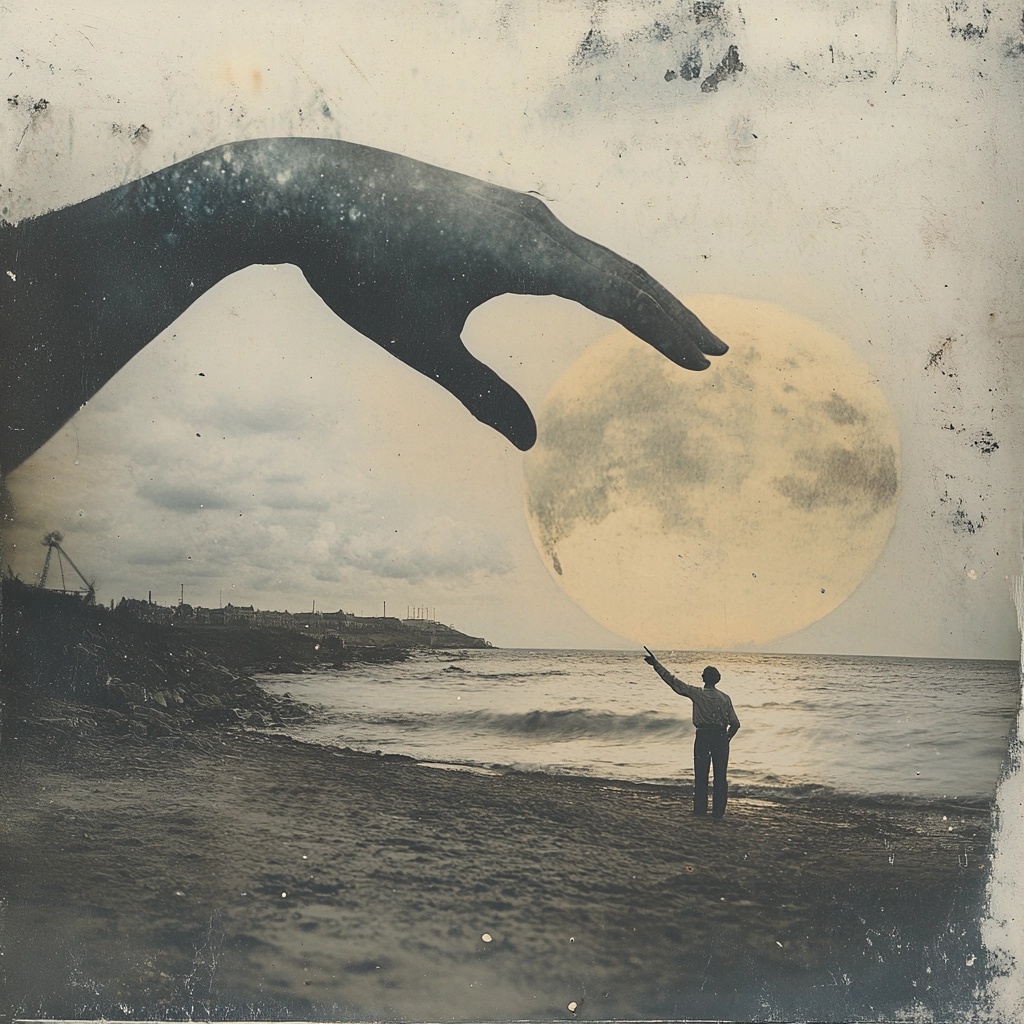PLAYING CATCH (2)
By:
June 13, 2025

Algernon Blackwood’s “Playing Catch” appeared in the 1924 collection Tongues of Fire and Other Sketches. HiLoBooks is pleased to serialize the story for HILOBROW’s readers.
ALL INSTALLMENTS: 1 | 2 | 3 | 4 | 5.
The grandeur of the gesture, magnificent, even godlike, left him breathless, but exhilarated. Yet it caused him no alarm, nor was he conscious of surprise. Such immense proportions, he reflected, must be angelic, surely. Why no head and shoulders were visible puzzled him — for his mind began to work at once — until he realised that, being of the same colour as the golden sunset, they merged into its background, so that the sky revealed no outline. Moreover, the arm, he observed, was slightly richer in red and gold than the tint of the air, and thus showed up nicely. The hand, of a splendid crimson, was fiery rather, and the colossal fingers that gripped the moon in their great curving clutch, stood out, dark-ridged like mountains, against the silver. It was an impressive and inspiring sight.
Mr. Anthony stood spellbound, watching the moon as she flew plunging away into space. Such headlong speed enthralled him. It was thrilling, too, to remember that this outer space, being of ether only, was completely black. Had he been out there himself, he would have appeared as a solitary bright figure amid Egyptian darkness. This reflection, certainly, occurred to him. He would be a shining figure. Mabel, too, occurred to him. Did Mabel, he asked himself, witness what he witnessed? Was his strange privilege shared? ..
He watched the flying moon. Already she was half her usual size. In fifteen seconds, she was no larger than a tangerine orange; in thirty, she resembled a sparkling marble; in forty, a shining pea; in sixty, a glittering bead; in seventy-five, a pinhead; and in ninety, a mere starry point that was barely visible at all against the sunset afterglow. The speed, the distance, the power behind the throw, the possible immediate effect upon the tide, the terror of any human beings who were looking on—all these details filled him with a high sense of happiness that was elation. He felt, to use his own favourite word, stimulated.
Then other points of view began to occur to him, modifying his first emotion of pure enjoyment. The human standpoint struck him. He noticed that the sky looked bare, undressed, naked somewhere, even — he used poetic license — a little lonely. He felt sorry that the moon had gone. He found that he missed her. He experienced regret. He was glad, therefore, to see that the point of light she had now become held stationary, and that no further dwindling occurred. The moon, then, had not completely vanished. Had she done so he would have felt bereft. Only a few days before he had told his landlady’s child that he knew of no reason why the earth should have a moon at all, since not all planets had these pretty, faithful satellites, and the child had asked at once:
“But what would happen at night, then?”
It was this simple human point of view that now modified his first emotion somewhat. He felt precisely as the child felt: “What would happen at night without a moon?”
It was with sincere relief and pleasure, therefore, after the minute and a half had passed, that he noted she was now growing bigger again. She was returning. She was on her way back. He watched her rapidly grow larger, as she approached at appalling speed. The point, bead, pea, marble and orange sizes were reached and passed successively, and ninety seconds later she had almost resumed her normal size and appearance again. Mr. Anthony’s fear that she would grow larger still and come crashing down upon the earth, obliterating perhaps Dymchurch, was hardly born before it was allayed. He watched with beating heart and straining eyes. He saw the gigantic arm and hand again shoot forth. The enormous fingers caught her, clutched her, then placed her with easy accuracy exactly where she would have moved to in these three minutes had her course not been interrupted. The same side as before shone placidly down. She was not a fraction turned. The stupendous arm and hand at once withdrew and sank below the sea. The sky was as it had been. Mr. Anthony, tears of joy in his eyes and wonder in his heart, but outwardly quite calm, resumed his walk home along the seafront towards his lodgings. …
The awful occurrence, for most, must have been dislocating, yet Mr. Anthony faced it with equilibrium. His joy was not hysterical. Accustomed to speculations concerning the unknown and unexpected, he maintained his poise quite admirably. He did not, so to speak, fall flat upon his face, prostrate in worship, although both awe and reverence were touched. The experience, he argued, was not merely a vision which could be analysed away next morning, for his mind retained its logical, observant processes, his reason worked as usual. Memory, judgment, imagination, the three great faculties, functioned properly. It was, therefore, no hallucination, in which these faculties are notoriously in abeyance. It was an honest, a genuine phenomenon.
RADIUM AGE PROTO-SF: “Radium Age” is Josh Glenn’s name for the nascent sf genre’s c. 1900–1935 era, a period which saw the discovery of radioactivity, i.e., the revelation that matter itself is constantly in movement — a fitting metaphor for the first decades of the 20th century, during which old scientific, religious, political, and social certainties were shattered. More info here.
SERIALIZED BY HILOBOOKS: James Parker’s Cocky the Fox | Annalee Newitz’s “The Great Oxygen Race” | Matthew Battles’s “Imago” | & many more original and reissued novels and stories.
